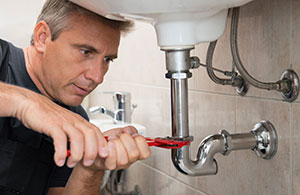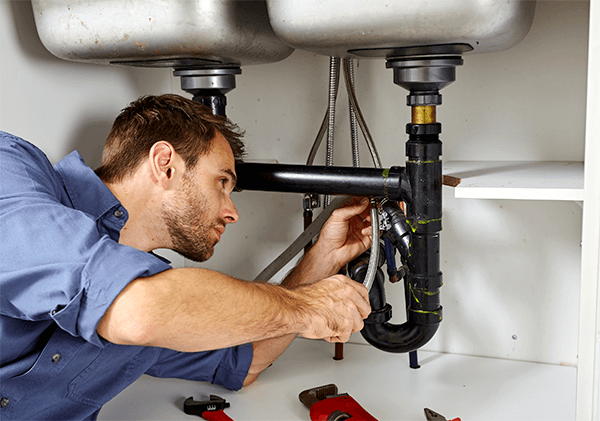Do you find yourself in search of facts and techniques about What to Do During a Plumbing Emergency?

Pipes emergencies can strike at any moment, creating anxiety and possible damage to your home. Whether it's a ruptured pipe, a stopped up drainpipe, or a leaking tap, knowing exactly how to take care of the situation until a specialist plumbing professional gets here can save you from additional issues. This article offers crucial emergency plumbing suggestions to aid you mitigate damage and gain back control throughout a plumbing dilemma.
Switch off the Water
The very first step in any plumbing emergency is to shut down the water. For local issues, such as a leaking faucet or commode, turn off the valve near the fixture. In the case of a major leak or burst pipe, locate your home's major water shut-off shutoff and turn it off instantly. Understanding the place of these valves in advance can save important time during an emergency situation.
Shut Off Your Water Heater
In certain emergencies, such as a burst pipeline, it's smart to shut off your water heater. This prevents overheating or damages to the device when water quits flowing. Turn off the power supply to the hot water heater (electrical or gas) and allow it cool to stay clear of possible hazards.
Momentarily Quit a Ruptured Pipeline
A burst pipeline can lead to significant water damages in mins. To mitigate the problem:
Call an expert plumber quickly to attend to the problem completely.
Have an Emergency Situation Plumbing Package
Prepare a standard plumbing emergency situation package to take care of small problems efficiently. Your package needs to consist of:
Having these devices handy can make a considerable distinction in your capability to handle emergency situations.
Unclog Drains Pipes Safely.
A clogged drainpipe can be a discouraging and messy concern. Right here's how to tackle it:.
If these approaches don't function, prevent making use of extreme pressure, as it may get worse the obstruction.
Take Care Of Overflowing Toilets.
An overflowing commode can cause immediate chaos. Below's what you must do:.
Address Little Leakages with Temporary Fixes.
Little leakages can quickly become substantial troubles if left unattended. Use these momentary solutions until expert help shows up:.
While these solutions aren't permanent, they can help minimize water loss and damage.
Handle Frozen Pipes Thoroughly.
In chillier climates, frozen pipelines are an usual emergency situation. If you believe a frozen pipe:.
Know When to Call an Expert.
While quick fixes can help momentarily, particular pipes issues require immediate expert interest. Call a plumbing technician if:.
Promptly speaking to an expert ensures the concern is solved correctly and prevents additional complications.
Protect against Additional Damages.
Taking fast action to decrease damage can save you money and time in the long run. Below's exactly how:.
Conclusion.
Plumbing emergencies can be frustrating, yet with the best expertise and tools, you can handle the situation successfully until assistance gets here. By shutting off the water supply, dealing with tiny leaks, and utilizing short-lived fixes, you can lessen damage and keep your home safe. Bear in mind, these tips are short-term remedies; constantly consult an accredited plumbing professional to handle the root cause of the issue. Prep work and quick reasoning are your best allies in any type of pipes emergency situation.
Expert Tips for Emergency Plumbing Repairs
Plumbing emergencies can be incredibly stressful and inconvenient. Whether it’s a burst pipe, a clogged drain, or a leaky faucet, these common plumbing emergencies need immediate attention to prevent further damage to your home. But before you panic, it’s important to understand the basics of plumbing repairs and the steps you can take to address these emergencies. In this article, we will share some expert tips to help you navigate through these situations and minimize potential water damage.
Identifying Common Plumbing Emergencies
Leaky pipes and faucets Clogged drains and toilets Burst pipes Low water pressure Water heater problems Essential Tools for Plumbing Repairs
Plunger: Useful for unclogging toilets and drains Adjustable wrench: Needed for tightening or loosening nuts and bolts Pipe wrench: Ideal for gripping and turning pipes Tape measure: Necessary for accurate pipe measurements Plumber’s tape: Helps create watertight seals Understanding Emergency Plumbing Services
Emergency plumbing services are designed to provide immediate assistance for unexpected plumbing issues that can cause significant damage to your home, business, or health. These services are typically available 24/7 and are staffed by experienced plumbers who can quickly diagnose and repair a wide range of plumbing problems.
When a plumbing emergency strikes, time is of the essence. Whether it’s a burst pipe flooding your basement or a gas leak posing a serious risk, emergency plumbing services ensure that help is just a phone call away. These professionals are equipped with the tools and expertise to handle any situation, minimizing damage and restoring your plumbing system to proper working order.
What Constitutes a Plumbing Emergency?
Burst pipes or water supply lines: These can cause extensive water damage and need immediate repair to prevent flooding. Gas leaks or suspected gas leaks: Gas leaks are extremely dangerous and require prompt attention to avoid potential explosions or health hazards. Sewer backups or overflows: These can lead to unsanitary conditions and significant property damage. Clogged drains or toilets causing water to overflow: Overflowing water can damage floors, walls, and other structures. Leaks or water damage causing structural damage: Persistent leaks can weaken the structural integrity of your home or business. No hot water or heating: A lack of hot water can be more than an inconvenience, especially in colder months. Common Causes of Plumbing Emergencies
Aging or corroded pipes: Over time, pipes can deteriorate, leading to leaks or bursts. Improperly installed or maintained plumbing fixtures: Faulty installations or lack of maintenance can result in unexpected failures. Tree roots or other debris infiltrating your sewer line: Roots can grow into pipes, causing blockages and backups. Frozen pipes or water supply lines: In colder climates, pipes can freeze and burst, leading to significant water damage. High water pressure or sudden changes in water pressure: Excessive pressure can strain pipes and fixtures, causing them to fail. Natural disasters such as floods or earthquakes: These events can disrupt your plumbing system and cause severe damage. Steps to Minimize Water Damage
Locate the water shut-off valve: Knowing where the valve is can help you quickly cut off the water supply to the affected area. Turn off the water heater: If there’s a risk of water coming into contact with the heating element, make sure to turn off the water heater to avoid potential accidents. Open faucets and drain pipes: By opening faucets and drain pipes, you can relieve pressure and empty any standing water. Collect and contain water: Use towels, buckets, or bins to collect water and prevent it from spreading to other areas of your home. https://leecountyplumbingandwellservice.com/expert-tips-for-emergency-plumbing-repairs/

I'm very fascinated with and I really hope you enjoyed the new article. In case you enjoyed reading our post kindly don't forget to pass it around. Thanks a lot for being here. Please pay a visit to our site back soon.
Click Here